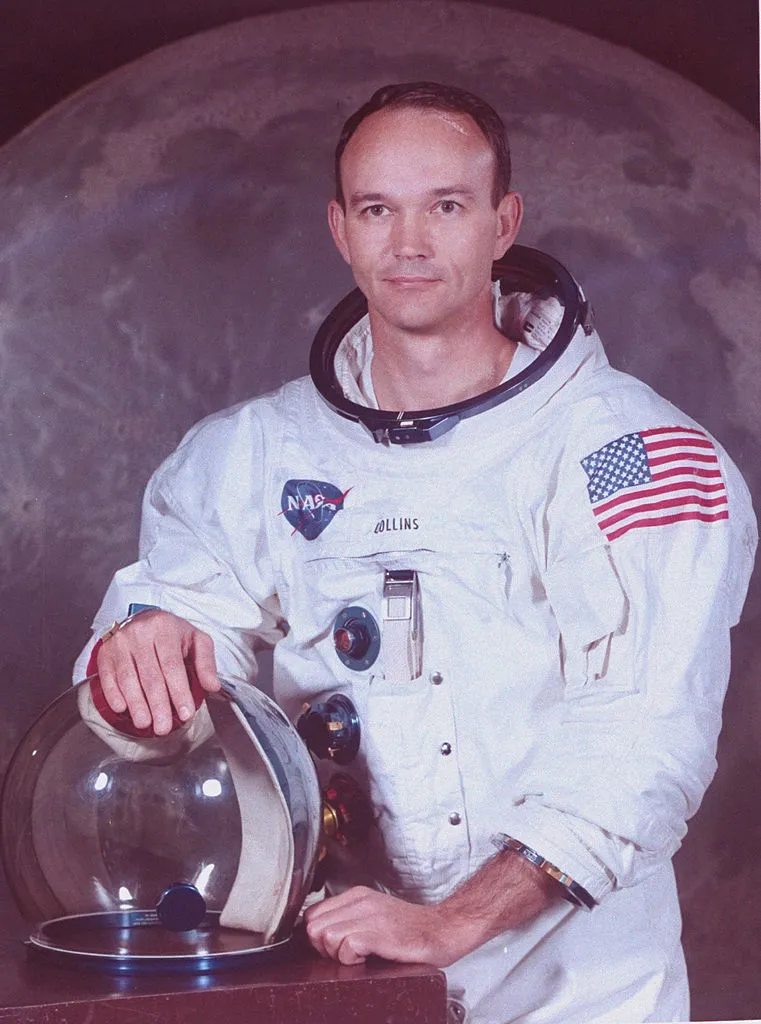Michael Collins was born in Rome in 1930, while his father was stationed there as an Army attaché. His father’s military career meant the family moved frequently and, as well as Italy, Collins spent his childhood in Oklahoma, New York, Puerto Rico and Virginia.
Although Collins graduated from West Point Military Academy in 1952, an institution associated with the Army, he decided to join the Air Force instead. He flew fighters in Europe and went on to be an Air Force instructor before becoming a test pilot at Edwards Air Force Base in California in 1960. He joined NASA in 1963.
Collins was co-pilot aboard Gemini 10 in July 1966, with John Young in command, and made two spacewalks, becoming the first person ever to make more than one during a single mission.

A mix of bad luck and good fortune helped determine who would fly the historic first missions. Collins had originally been assigned to Apollo 8, but in 1968 he began to suffer from alarming incidents in which his legs would buckle for no apparent reason. The cause turned out to be trapped nerves in his spine. He underwent successful surgery to remedy the problem, which delayed his return to flight status until a later mission, which turned out to be Apollo 11.
Collins’s autobiography, Carrying The Fire: An Astronaut’s Journey, first published in 1974, is a lively account of his experiences at NASA, and of flying around the Moon in support of his Apollo colleagues. A modest and thoughtful man, he once said that “...the main qualification for flying to the Moon was to have been born at the right time, 1930, give or take a year or two.”
He was sensitive to the charge that NASA’s technical language had stripped Apollo 11 of some of its meaning, at least in the eyes of the general public. “I think a future flight should include a poet, a priest and a philosopher,” he said in 1973. “Then we might get a much better idea of what we saw.”
Biography
31 October 1930 - Michael Collins is born in Rome to Major General James Lawton Collins and Virginia Stewart.
May 1952 - Graduates from West Point Military Academy.
June 1954 - Transfers to Chaumont-Semoutiers Air Base, eastern France, with the US Air Force.
Summer 1956 - Forced to eject over France due to a fire in his F-86 Sabre jet.
Summer 1957 - Marries Patricia Finnigan. They have three children, Kate, Ann and Michael Jr.
August 1960 - Joins the US Air Force Experimental Flight Test Pilot School.
February 1962 - Decides to become an astronaut after John Glenn’s orbit of the Earth.
October 1963 - Selected for NASA’s third astronaut group on the basis of his record as a test pilot.
18 July 1966 - Launches into space as pilot for Gemini 10 and conducts two spacewalks.
July 1968 - A trapped nerve in Collins’s upper spine requires surgery, removing him from the crew of Apollo 8.
16 July 1969 - Lifts off aboard Apollo 11 as the mission’s command module pilot.
1970 - Retires from NASA and becomes Assistant Secretary of State for Public Affairs.
January 1971 - Becomes director of the Smithsonian Institution’s Air and Space Museum.
1974 - Attends Harvard Business School.
1978 - Retires from the Air Force with the rank of major general and becomes under-secretary of the Smithsonian Institution.
1980 - Becomes vice-president of LTV Aerospace.
1985 - Starts his own consultancy firm, Michael Collins Associates.
Read more Apollo biographies:
- Neil Armstrong: Apollo 11 mission commander
- The last man on the Moon: Gene Cernan in pictures
- John Glenn – the space pioneer’s life in pictures
- Apollo 11 Mission Control: the people behind the Moon landing [via BBC Sky At Night Magazine]
Follow Science Focus onTwitter,Facebook, Instagramand Flipboard